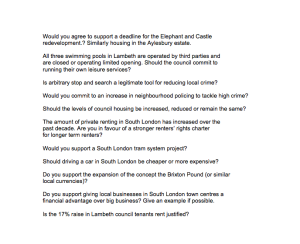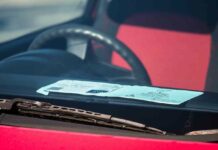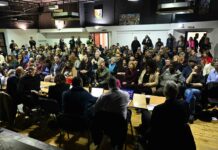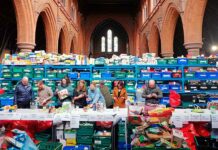All over the country, voter apathy is high. How is the national trend playing out in Brixton? What is being done to solve low voter turnout?
Introducing a series on local democracy in the run-up to the General Election, Brixton Blog talks to an e-activist from the new South London Democracy Club.

Richard Pope is an online democracy evangelist. From his flat in Electric Avenue, he contributes to several different websites aimed at making politics easily accessible to everyone, and has recently helped to set up the South London Democracy Club. The club met for the first time at the end of February, gratifyingly near the site of the Chartist gathering in Kennington Park.
In the last General Election, voter turnout in all three constituencies to which Brixton belongs was depressingly low. At its best in Dulwich and Norwood, it stood at 58.1% – still 3.3% below the 61.4% national average. At its worst in Vauxhall, it was just 46.9%. This year, voter apathy across the country is expected to increase even further.
Yet Brixton is by no means an apolitical community. Residents are highly involved in local issues. Last week, 10,000 young people voted in the Lambeth Youth Elections. Pope argues that Brixton is “innately political”. “The first time I went to a police consultancy group meeting, it was buzzing with ideas and politics. People really, really care about what happens in the council. You can just be talking to someone round the pub and they get it; and there are real problems in South London.” Somewhere along the line marked by the Iraq War and the expenses scandal, there has been a disconnect between local and national politics. Richard Pope wants to solve that problem.
His philosophy is simple: create online datasets which give “normal people more information” about political decisions and, by establishing an online record, make politicians more accountable.
Pope’s main focus is The Straight Choice, a site he co-founded during the elections in 2005. “Things were being said carelessly in campaign leaflets with the expectation that people would just throw them away.” Pope was working on a site called Election Memory at the time, uploading all Lambeth election manifestos onto a single site, but he soon realised that the real problem was with the leaflets. “An anonymous leaflet, which almost certainly came from either the Conservatives or Labour, was put out insinuating some rather nasty things about a gay Lib Dem councillor visiting schools. We wanted to try to catch people when they were breaking the law and make the whole thing more relevant to people’s lives.” The Straight Choice works by encouraging people to scan and upload any election leaflets they receive. The moderators then identify any illegal or “dodgy” claims and shout about them to the relevant bodies.
The online community is tight knit. Pope also works for mySociety, which runs sites like TheyWorkForYou.com and the Number 10 petitions website.
The newly established Democracy Club is what Pope describes as the “ring around these groups”. It works by giving out weekly national tasks to volunteers, the first of which was to organise a local meeting to coordinate activism in the constituencies. South London Democracy Club met last month at The Dog House in Kennington. Only seven people were there, but it is the data they want to collect, not the number of attendees, that is most important.
They came up with ten questions to put to all candidates running for election in South London. Any newcomers to the Club can suggest additional questions. The initial questions handled the following (hardly surprising) issues: Elephant and Castle redevelopment; Lambeth leisure services; stop and search; neighbourhood policing; council housing; private renting; a South London tram network; car use in South London; local currencies; local business support; and the 17% rise in council rent. The answers from candidates on these issues will be uploaded onto the site so that voters can hold MPs to their word after the election.

What makes Pope think that any of this will actually work? “We’ll have all these datasets from Democracy Club after the election which anyone can use as they like, but they will also end up back on the website TheyWorkForYou, one of the biggest political websites in the country.” The people at TheyWorkForYou know that politicians pay attention to the site, because they send angry emails about what’s been put up. “From research, we also know that the users are not normal internet users. The whole reason for all of these websites is to try to make the data as mass market as possible because the data published online by parliament is in a format that is undigestable by the average person.”
The online community behind Democracy Club should be applauded for recognising that apathy is not about laziness or stupidity. Pope makes this very clear. “Voter turnout comes with making politics more relevant to people. Most attempts to get people voting are a bit patronising. They don’t think about whether they have the information available to make what they consider to be a choice. You can’t just force people to go out and vote, you have to give them the information to make their own choice.”







[…] and national politics. Richard Pope wants to solve that problem.Good for him. And good for the Brixton Blog. […]
[…] been a real blow to Brixton Market traders this year and here’s some proof. Local blogger and ‘e-activist’ Richard Pope has submitted a Freedom of Information request for the Market occupancy rates over the […]
[…] that time ago in February (remember the snow?), South London Democracy Club put ten questions to local candidates on issues ranging from stop and search to a South London tram […]
[…] more than the pet project of a handful of dedicated reformists; now it’s the hot new topic. Data websites are leading the way to ensure accountability, and they are not the only ones interested in fixing the disconnect between local and national […]